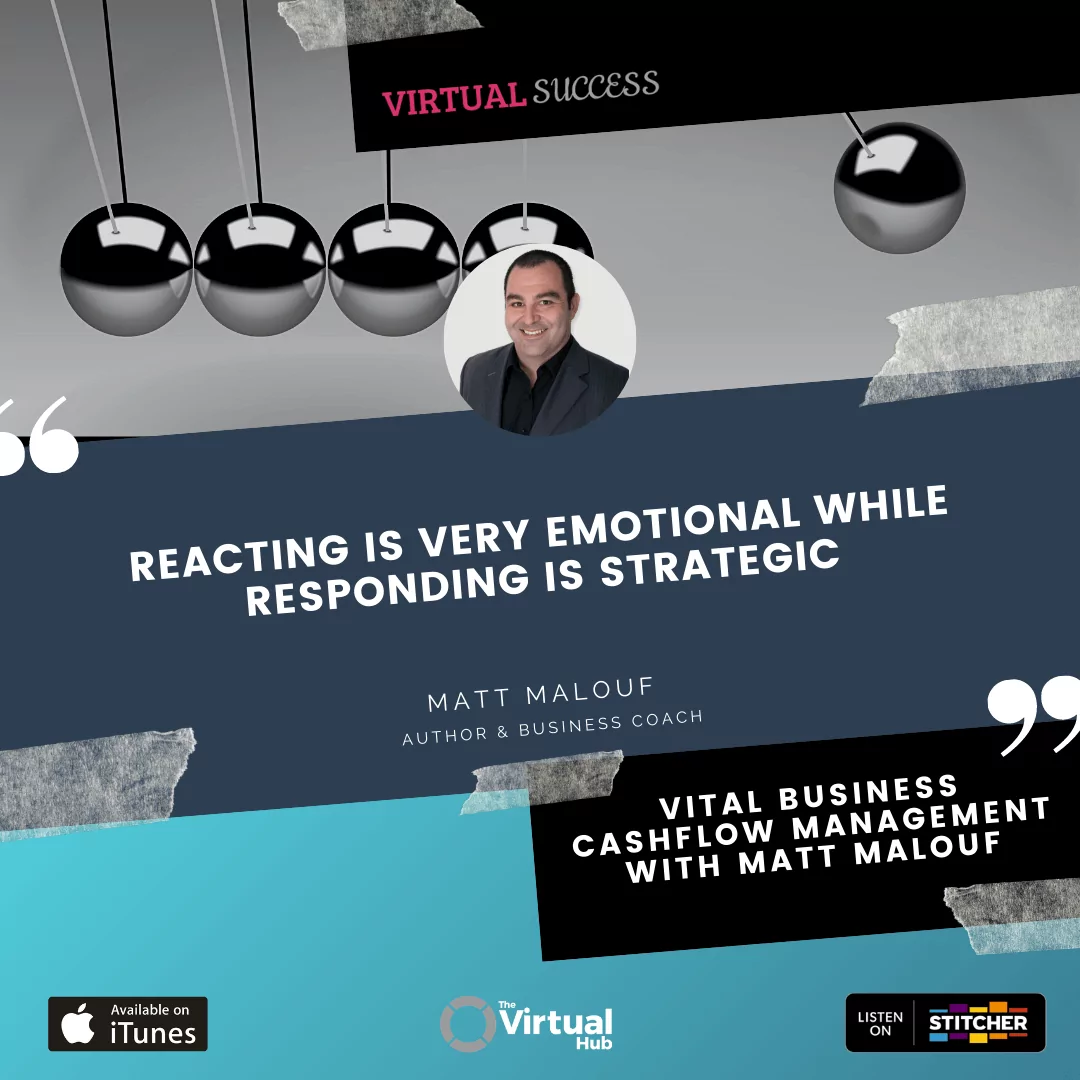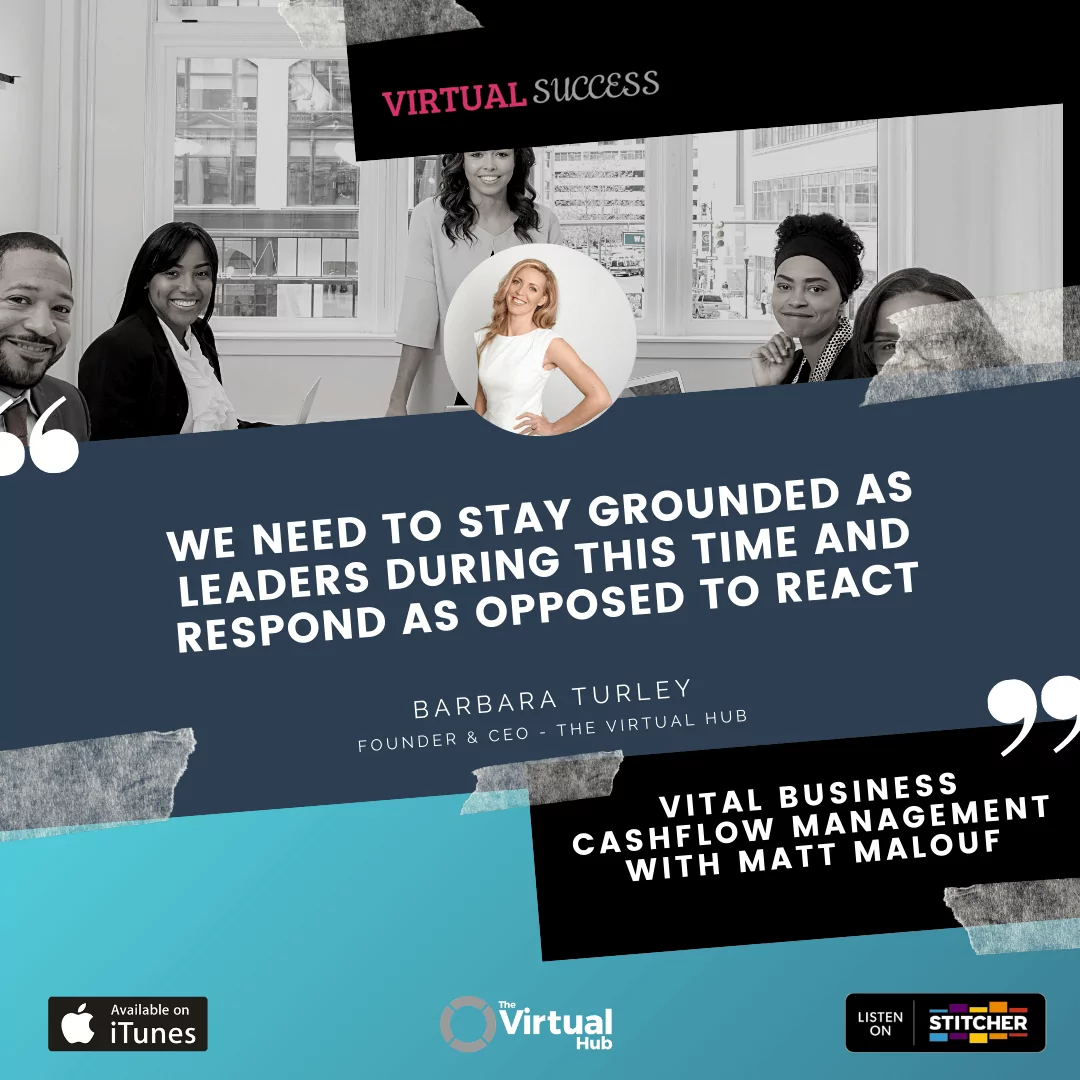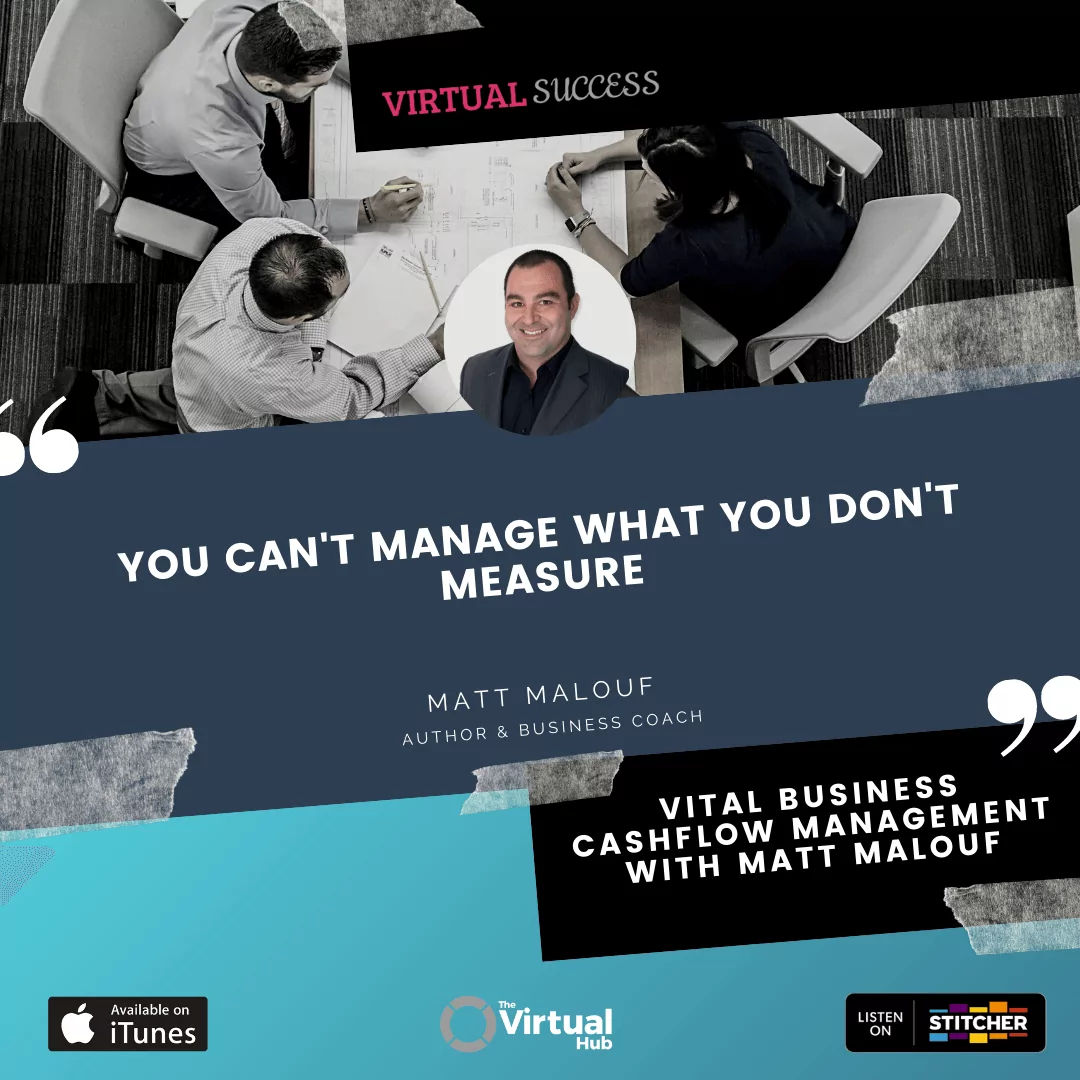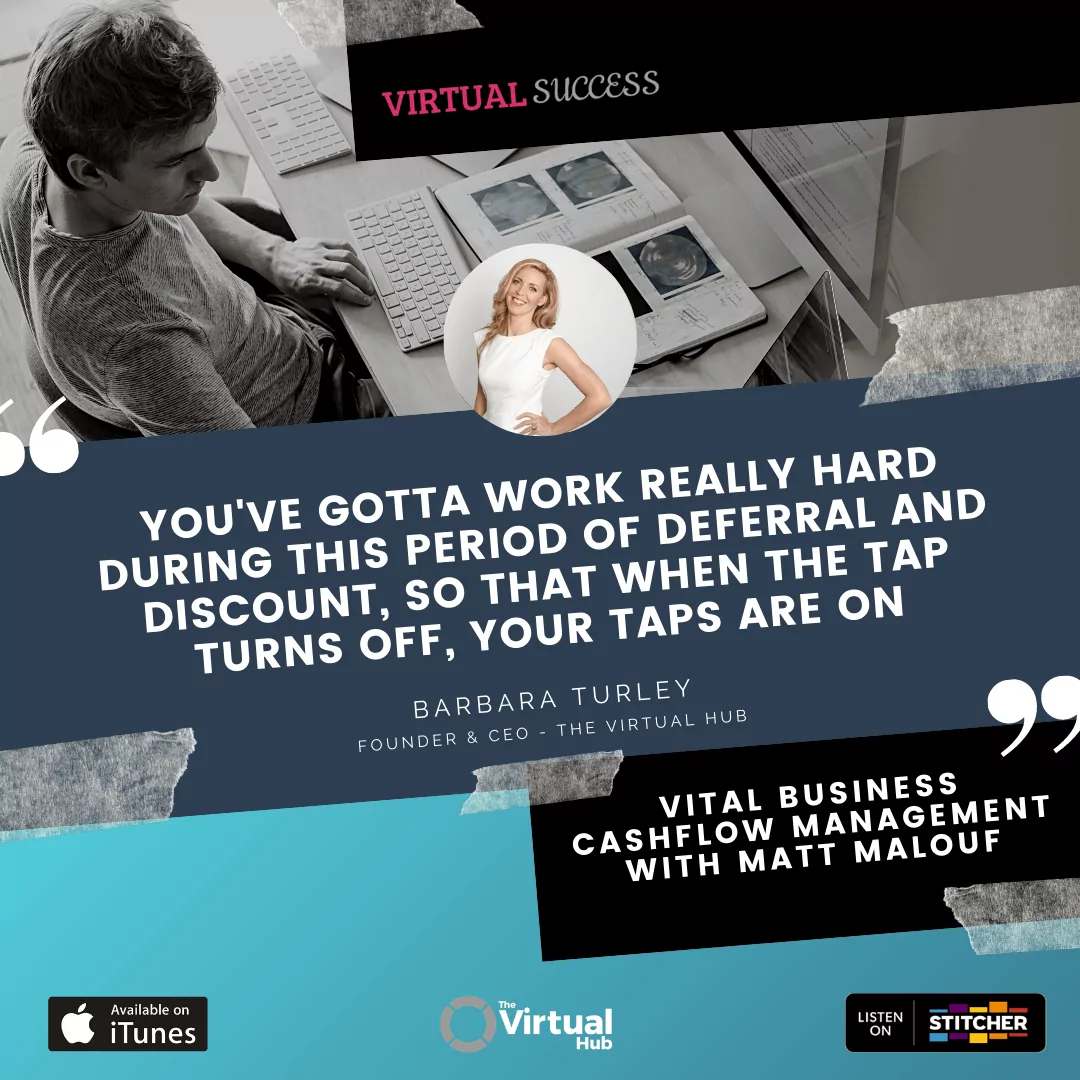Vital Business Cashflow Management with Matt Malouf
Want the transcript? Download it here.
In this episode, Barbara Turley is joined by her co-host Matt Malouf to talk about How to Manage Cash Flow in a Crisis and Lead your Business to Survival and come out Strong.
Some of the key points include:
- What is cash flow analysis and how it is done
- How to survive in this crisis
- The difference between a Bookkeeper, an Accountant, and a CFO
- The importance of numbers/data in your business
Let us know what your key takeout has been from this episode and join the continuing conversation over in the Virtual Success Facebook Group.
In this episode:
02:06 Cashflow Analysis and Forecasting
05:48 How to help business owners with their Cash flow statements
08:48 Reacting vs Responding
10:57 Importance of Cashflow analysis during this crisis
18:39 90daycashflow.com
22:03 Accountant vs CFO
26:56 Importance of numbers in the business
28:06 Wrapping things up
Intro: Do you find yourself running out of time to accomplish your work, are you spending time doing things that you’re not that good at? There are effective ways to outsource these tasks so you can focus on your business. This is the Virtual Success Show, we bring the inside scoop on outsourcing success for entrepreneurs by entrepreneurs. And now, here are your hosts Matt Malouf and Barbara Turley.
Barbara Turley: Hey, everyone, and welcome back to another episode of the Virtual Success Show where I’m finally rejoined again, I’ve managed to coax my co-host, Matt Malouf, back to join me on this show. I’m your co-host, Barbara Turley. Matt, thanks for coming back and joining us on the show again,
Matt Malouf: No worries and yeah. So sorry, I haven’t been, I’ve been so proud of all the episodes you’ve been doing and we should’ve been on there. It’s just been one of those crazy times at the moment.
Barbara Turley: Absolutely. I know if, we’re you know, as we’re recording this today. We’re sort of right in the middle of this Coronavirus situation that’s going on. But it’s a very interesting time for the show Matt. And you know, the concept of remote working and virtual teams. And we’ve actually seen a massive uplift in people interested in actually the podcast. And the stuff we’ve been talking about for the last three years on this podcast has all of a sudden become even more important than ever before.
So what I wanted to talk to, I’m getting Matt back on the show specifically to talk today about cash flow. It’s not really a virtual team kind of topic, but it’s important in the environment that we’re in right now. And Matt, you’ve been out talking a lot about cash burn, cash flow forecasting, managing your cash and being lean in this environment, but not so lean that you can’t come out strong. So I want to dig into this topic with you. First of all, let’s start with talking about cash flow analysis and forecasting and watching your cash. Can you start at the beginning and talk to us about what do we actually do to do that? Because lots of us don’t even know how to do that.
Cashflow Analysis and Forecasting
Matt Malouf: Let me start with I think the importance around cash flow is that it’s more than just looking at your bank account. And I was, I did a presentation this morning. I think one of the biggest mistakes so many smaller, medium business owners make is their key report that they rely on in their business is an ATM receipt, to tell them what’s going on in their business. And the reality is that cash in your business is like oxygen to a human, where you can only last a very short period of time without oxygen and in a business can only last a very short period of time without cash.
And so, in normal practices, in normal and I’m using very common, as in normal times, we should be managing our cash flow. What does that mean, that means we should be predicting based on our leads and conversion, cash coming in. And we need to factor in things like, if our business invoices, what’s our average collection period, and being very conservative on our predictions on cash in. And then the second part of that is in looking and having a deep understanding of cash leaving our business and that’s gonna be in the form of our fixed expenses.
So things like your rent, if you’ve got salaried employees, if you’ve got loan repayments that you may make, if you’ve got other kinds of subscription services or contractors that you pay regularly, if fixed expenses, their expenses that you are incurred, irrespective of whether you make a sale or not. And then you’ve got to factor in your variable expenses into this cash burn rate. And then 30 in this way, so many business owners, they get it wrong and they fix it. It’s the non p&l cash transactions. So things like taxes that you have to pay. It might be inventory, often, you know, inventory is not impacting your profit and loss statement. It’s impacting your balance sheet. And so that cash that’s coming out of your business, cash that you need to spend in order if you don’t have any stock, you can’t sell any goods, but it’s often not calculated. And this is where you need to get really clear and understand that a cash flow statement is very different to a profit and loss budget.
Barbara Turley: Our business is even doing a cash flow statement. No I’m not. Are we doing cash flow statements? Do you find clients are really doing this stuff?
Matt Malouf: They’re not, but that’s why they’re wondering why they don’t have cash in their account. It’s why they’re sitting there looking at their p&l is going “I’ve got a profitable business, but I’ve got no cash”. And that’s often the gap is they don’t understand the impact of these non p&l items that are impacting their cash.
Barbara Turley: Yeah, I think this is a major problem. And I think at the moment when people are feeling in a crisis situation, like what we’re in right now, which is impacting business a lot and there’s handouts coming from governments, and there’s banks like deferring loans and stuff like that. It’s actually very difficult to get the headspace right to sit down and figure this out. So what, how are you helping clients with this? And how can we, how can we do this better for anyone listening?
How to help business owners with their Cash flow statements
Matt Malouf: So the first thing we’re getting everyone to do first, first of all, you’ve got to have clean data. And what I mean by that is that your accounts need to be up to date, they need to be reconciled. You can’t understand where things are at if you’ve got messy data or out of date data. The second thing is then going line by line through the last three months at a minimum of what cash has gone out of your business. And asking yourself, Is this still necessary for us to operate and move forward? And I guess it’s a bit like, you’ve got to cut the fat out of your business.
But what you don’t want to do, you don’t want to deplete muscle or bone. You just want to cut the fat out because the muscle and bone is essential for you to be able to not only survive through this, but then thrive on the other side of it. So you know, things like, a lot of the things that we’re seeing, their nice to have. So it may have been, yeah items that you had in your office, kitchen. It may have been subscriptions that you may have only use part of the time, but not all the time.
I had some clients that had, they had a Click Funnels account, a lead pages account, they had this, they had four things that could do the same thing. And so it was a case of actually going through line by line over the last three months and looking at all of that. The third thing then is understanding what is required for you to continue to operate your business and move forward. And so what happens is people just slash and burn and they cut and they cut and they cut and they cut and they cut. And then all of a sudden, they’re the person doing everything. And they’re like wondering why they’re not moving forward with any speed or not able to generate any revenue and cash. coming in.
Barbara Turley: Yeah, we saw with our clients just with The Virtual Hub exactly this was happening. Initially, people were like, “Ohh slash the VA, slash the team, slash everything. And then they came back couple of weeks later going, “Oh, we need to cancel the cancel”. Because they realize that actually if this, Yes, they were trying to cut costs, but then they were sitting up to two o’clock in the morning doing landing pages or doing stuff or do answering, you know, customer support tickets or whatever it was that they were cutting.
And then they’ve no time energy, they might have a bit of money left, but they’ve no time energy or anything left to actually drive the business forward and get out of this crisis. So we did see that happen and people kind of panicked and cancel the service and then try and then came back looking to uncancel it, and one client actually came back and grew, which was quite interesting.
Reacting vs Responding
Matt Malouf: Yeah, and we were the same with coaching. The first thing people’s reaction was to cut business coaching, but once they settle down their response was, “Hey, we need you more than ever”. And I think that’s an important point that I wanted to hear, it’s, are you reacting? Or are you responding? and reacting is very emotional. It’s very short term thinking. It’s not even often even tactical, it’s just, it’s that field. And not a lot of thought that’s gone into it versus responding is strategic. And you need to be being strategic through this time. Otherwise, you won’t have a business off the other side. And that’s not being dramatic. I just, that’s my, true to my belief right now.
Barbara Turley: I firmly believe this. And I, you know, it reminds me of a video I did actually for our clients back in the middle of the crisis, we were sort of being put, you know, we have office based VAs, as I was telling you about this Matt, where everyone’s in an office and we have clients who are saying, “I want my VA to work from home, I don’t see why my VA can’t work from home”, and I have to sort of push back and say to clients, and actually they understood once I explained it, I said, you know, we’ve got 125 staff in an office.
And it’s important to stay grounded in these times and to actually, as you say, respond rather than react because a reaction by me would have been, yeah, yeah, let’s do this. And then we cause a domino effect through the office of people who weren’t allowed to go home versus people who were and instead, what I did was I really pushed back. I tried to gain some, you know, composure and some time to really think this through, examine the data and then make a decision about our stages of response. And we were responding for all 125 people and not just one.
So it’s that yeah, reacting versus responding can actually be applied in loads of different areas, not just your decisions around the cash of the business, but in order to come out strong, you’re right we need to stay grounded as leaders during this time and respond as opposed to react. So I love that comment that you made.
Importance of Cashflow analysis during this crisis
Matt Malouf: I think coming back to cash burn rate then to, Barbara just to add to what I was saying before, is you need to go a little bit granular on this. And what I mean by granular is like, normally, we would be looking at probably weekly or monthly style cash flows for businesses. And the tool that we built for our clients, which is available for free also will give everyone a link later on. We actually built a daily cash flow. And for me, I remember when I read the E myth the first time and in every other time I’ve read it, you can’t manage what you don’t measure. And because everything was crashing so fast, business was drying up so quickly for so many companies.
We knew we had to look at this daily, not weekly, a week. I don’t know about you, but most of the people we were working with, a day felt like a week’s worth of work at the beginning of this. And it was like things within, things were changing so fast. I work with some gyms and I remember, on the, it was a Friday, I met with them, we put the new plan in place based on the restrictions that have been placed. And then Sunday night, the Prime Minister of Australia comes out and says, midday tomorrow, you’re gonna be closed. And so we had to move quickly. But also to, in order to move, in order to respond, we needed to know the impact that decisions were going to have. And so why we went daily was because this way we could actually understand what was happening in this time of crisis real quick, and it wasn’t getting paralysis by analysis. It was about having information on hand quickly.
And the metaphor I use for this, it’s like, it’s almost like we had to go from the dashboard that maybe a commercial airliner would have used, to a dashboard, now a fighter jet would use and we had to upgrade it and a fighter jet because it’s a precision high performance machine, it has a lot more dials and feedback mechanisms happening in order to perform at that level, versus a commercial airliner, which is still a high performance machine, but not to the same level as a fighter jet.
And so the more granular we went with people, the more certainty they had in their decisions because they had the data to support what was going on. And we knew that, okay, should we pay this supplier today, or next week, and then we look at how much cash came in yesterday. And then we looked at what our projection was, and then we go, look what we’re going to do, we’re going to go back to them and we’re going to say we’re going to pay them 50% today, we’re going to pay them 50% next Monday, and what we found by managing it that way, we were on the front foot, where we’re in control. And all these businesses are now in a position of strength where they’ve now been able to protect what they had and pivot with confidence, versus putting their hands in the air and hoping.
Barbara Turley: I love that. What I was thinking, as you were talking, is that the businesses that are just facing this head on and doing this work, because a lot of people are gonna run a mile from this because it’s, you know, it’s like the numbers, nobody likes to do it. It’s like making processes. It’s excruciating for some people. But it did, the work that you do on this pays dividends forever, because I was thinking, you know, I think the businesses that are gonna do this work with you and all this cash flow analysis and the stuff you’re talking about, are not only gonna come out stronger out of this when, I keep talking about, when the gun goes off, because it’s like a race right when the gun goes off, that’s when the tide will go out. And those who have prepared during this boot camp time will be the ones that will kind of come out strong out of this. But they’ll go on strong forever, because you’ll have learned this skill during this time. And it’s a skill that you’ll continue on in business and it’ll actually make a lot stronger business thereafter. As the saying goes, never waste a good crisis. So this work, doing this work now I think is gonna be pivotal for those businesses and for all businesses,
Matt Malouf: 100%. And you know, it’s interesting about you saying when the gun goes off, yeah, everything is disguised at the moment. And this is what everyone needs to understand because, economies have been propped up by government stimulus. We’re in a shutdown circumstance, governments are giving handouts. I know here in Australia, you know, you’re getting, whether it’s the job keeper payments, you’re getting cash flow boost, you’re getting a whole heap of incentives and payments, you’re getting rent reductions, you’re able to put home loans or other loans on hold. So you’ve given this false sense of security. But the reality is, once that all goes away, and this is what we’re doing with the cash flow forecasting we’re doing with our clients.
Well, while we’re looking at the next 90 days, we’re projecting out for them for the next 12 months, and we go okay, what happens when the job keeper stimulus finishes. What does your cash flow and your profitability look like then? What happens if your landlord reneges on what they’re saying, and he gives you half the period of time for rent relief? What if the banks turn around and change what’s happening, and we run all these different scenarios, and we can do it quite quickly once you’ve got everything set up. And I think that’s the key. The pain in anything is in the setup.
virt
One of the episodes we’ve done, Barbara, where we talk about slowing down to speed up, you know, it’s often in setting up your systems and processes we know it takes longer initially. And that’s why that mindset says, “Ah, that can wait till later” or “It’s quicker for me to do it myself”. Right now, you don’t have the luxury of waiting to do this, but the business owners that set this up, understand that now they can operate and make decisions with a higher degree of certainty, it’s not guaranteed that that’s gonna be the outcome, but at least they’ve got a visual and they can see what’s happening, versus having everything in their head and hoping.
Barbara Turley: Yeah, I agree. And I think, you know, you were saying there about the, at the moment we’re in this kind of, it’s almost like a little golden period in the middle of the crisis where as you say, governments are handing out there’s money floating around, loans are on hold, and it can load people into a false sense of, you know, things are actually okay, I feel good. Except all that’s gonna stop and like unless you’re using, I actually heard somebody talk about this in a podcast recently. They were comparing like, they were saying, “Are you in summer camp? Or are you in boot camp right now?” Because anyone who’s sort of in summer camp, thinking you know, things are okay, I’m at home and money’s coming in and you’re just in this false sense of security. You’re not, you’re gonna be the one to not come out strong at the end of this.
The guys that are in boot camp going, I need to, you know, I’m working myself. Not that you want to work to the bone but you’ve gotta work really hard during this period of deferral and discount, so that when that tap turns off, your taps are on, and you’re actually able to come out and stand on your own two feet as a business again. I think that’s the important point, some people are just, yeah, like government handouts can make you feel safe. But if you’re not tackling this now, you won’t be able to tackle it when it turns off. That’s the issue because the race will have started and everything will speed up again. So Matt, you’ve got a great tool. You mentioned it in the middle of the show. I think it’s an amazing tool. It’s free. Tell us about it, 90daycashflow.com.
90daycashflow.com
Matt Malouf: Yes. So when this hit, I sort of tried to think real quick, what could we put together that could help people? So we built this interact, right? It’s a dynamic kind of Excel sheet, where if you input your expenses, so you basically just need to p&l. You put your expenses in and then you put the date of when things are gonna be paid in the month and which day of the month, 1-31. And then you put the frequency that things are gonna be paid, it will then go through and build a cash flow forecast for you both weekly and daily. And then what it will also do is, you can put in your revenue predictions, and again, it will feed that through the spreadsheet and it’s designed so that you can do it and keep it rolling on a week on week basis.
So we’ve had a lot of clients use this and it takes a little bit to get set up. But once it’s set up, it gives you clarity and it enables you to quickly see what’s going on and particularly revenue cash. And then the only thing you really need to update on a daily basis, once you’ve done the setup base is what your cash balance at the end of each day is so that it can recalibrate based on you know, what’s happened. You making all these predictions, each day you can go in, you’re putting your new cash balance. And the spreadsheet will then update accordingly to see where you’re at. What is your clarity on is, the how much the length of time you’re going to stay in positive cash flow. And you can run some scenarios on this or you can like if I get zero income on one of the companies that we did this with, we went, “if we get zero income for the next 90 days, and these are the expenses that come out, where do we lead” and you can run different scenarios on that.
Barbara Turley: What, I’m going to put it into marketing speak in my, I’ve looked at this and from listening to you talk, it, for me. It takes a huge amount of the pain away from getting started with this. If you know if you’re listening to this and thinking I haven’t done any of this because it can be very overwhelming. It’s a bit like when you’re starting processes and systems. And this little tool map takes a huge amount of the pain away, gives people a road map to get started in the actual picture. And I just want to tie this back in. I mean, this podcast is all about Virtual Success, which can can take many forms, but usually we’re talking about virtual teams and but in the environment we’re in right now everyone, like business has become a virtual experience now, because everyone’s working at home.
And I think I just want to finish on the fact that, you know, people don’t need, you know, the whole concept of a CFO or a virtual input to your business that is like, say, a CFO, Matt, I know you’re doing a lot of work in this area right now, supporting businesses as a kind of a member of their team, but you don’t need to be an employee or full time person on the team in order to help in this area. You know, can we talk maybe a little bit about that just to finish by the fact that you don’t need somebody 40 hours a week in this CFO role. But you can have a virtual input to this.
Accountant vs CFO
Matt Malouf: Absolutely. I think that most companies, yeah, realistically until you’re getting to, to probably, you know, $10 to $15 million of turnover, you don’t really need a full time internal accountant. However, on the road to that, you do need someone that has the financial acumen to be able to give you the foresight, and what a CFO does, a CFO looks forward work versus an accountant looks through your rearview mirror. So you still need your accountant for your compliance and your tax planning and you structures, but a CFO is going to help you look forward a strategic scenario, plan, review, stress test your ideas from a financial perspective. Because at the end of the day, I mean, you know, if we’re really going to look at these business, the game of business is all about making some money, right? I don’t know, anyone that’s in business doesn’t want to make any money. And so if you don’t be a numbers, how can you win the game. And so it’s critical that you understand the financial impact that your ideas and your plans have, so that you can not only survive, but thrive and go beyond.
So CFO really does help you with all of that. And I think the other thing too, is, I know one of the things that say our point of difference in our services, we monitor at our end everything on a daily basis. So you’ve got another set of eyes. So we just were looking at yet your dashboards and your numbers, provided everything’s set up correctly. And so we set up triggers and alerts so that we can advise you, Hey, did you know this happened, you need to look at it. And here are the decisions you need to consider. You need to either do this, or you need to do that. And we look at it purely from a financial perspective. So I think-
Barbara Turley: Do you think a lot of people are thinking that their accountant was doing that or are sort of thinking, Well, I have an account, I’ve got a great accountant. Talk to me a little bit, I just want to dig in here because the difference between an accountant and CFO I think people feel like, but I have a great accountant.
Matt Malouf: Your accountant will help you structure, your accountant will help you pay the right amount of tax. A really great accountant will have this set up for you. And look, I’m a recovering accountant. As many of you know, I started my career at Ernst & Young. But most accountants don’t do this because they don’t have the time or it’s not what their focus is. And their focus is compliance. Their focus is tax structures. And they just don’t have the time to invest and also you’re probably not investing enough with them for it to be financially viable for them to do this. But more importantly is, most of them don’t want to do it. That’s my experience.
Barbara Turley: Well, it’s not their thing, accountants are not doing that. That’s kind of not the role of an accountant. This is the role of a CFO. And that, you know, we did that show before around the difference between a project manager and an operations director and the different boundaries around roles. This is kind of the same conversation actually, between the role of an accountant versus the role of the CFO, they can be the same person, but only when those roles are defined. And they are very different functions within the business.
Matt Malouf: I’ll send a chart that we can put in the show notes, Barb which actually have defined what a bookkeeper, an accountant and the CFO, what a job descriptions are like, just key item,
Barbara Turley: That’d be great.
Matt Malouf: And it’s exactly what you said, it’s just wrong expectation. And so, the thing here is that you don’t need a full time CFO to do this. And if the structures and systems are set up properly, then you know, we meet with all of our clients monthly for 90 minutes to 2 hours, we often make half of that time with, its either just with the business owner or we do we split it which is half with the business owner and half of their team because it’s important that they understand the scoreboard as well. And when we say the team, it’s key people and what we do is we interpret the numbers into a language that the business owner can understand and act from and I think most business owners don’t actually understand the numbers like if I had to think of a few key phrases that a lot of business owners entrepreneurs came out with, one of them would be I’m not a numbers person, I’m a insert what I do,
Barbara Turley: I’m a great salesperson or I’m a great marketer or I’m a great whatever but I’m not a numbers per, yeah, loads people think they’re not numbers people
Importance of numbers in the business
Matt Malouf: And if you want to succeed short and long term in business, you need to understand the numbers but also have someone interpret them. So so that you can then make decisions. It’s a bit like, if I went to Germany now to do a business deal, I don’t speak German. So I would have a translator there that could translate the German conversation into English so that I could then converse and make decisions and negotiate accordingly. And that’s what a CFO does, I really would say that,
Barbara Turley: Well, what’s great about that is then you don’t need to be a numbers person, because you brought someone into your team that will interpret those numbers for you. So that because you’re a business person at the end of the day, you still need to know. But doesn’t mean you have to be in spreadsheets all day long buried by yourself. That’s kind of more numbers from it doing that. Yeah. Well, Matt, listen, 90daycashflow.com. Guys, go there, download the tool, and that can, you know, give you more insight into your numbers and will, I know you can, you know, get in touch with Matt through that site as well. Matt, any finishing thoughts or have we covered it all from, any finishing thoughts?
Wrapping things up
Matt Malouf: I probably just say this, like, reach out and get help with this, if it’s not your thing, but don’t neglect it. And so important, you need to know your cash burn rate, you need to have a cash flow forecast. If you’re going to really survive through this. It is like the, I guess, like the vital signs in your business. And if you know, if I was in intensive care, they’d have a heart rate monitor on me, they’d be testing my breathing, your cash flow is like that. So don’t neglect it and hope that you’re gonna get through, reach out and get the help you need. Our team can help, is on that site. You can get the tool you can get a 45 minute session with one of our team to help you put it together. But get the help because that’s how you will survive through this, through this time.
Barbara Turley: That’s great. Thanks so much Matt for diving into that with us because we know it’s really important. topic, all of the time, but in particularly right now when we’re in the middle of a crisis, and people are probably feeling like rabbit in the headlights with this. So guys, if you found this show useful, as usual, you know, share it around. This is something right now that a lot of business owners need to dive into. So please share the show around give us a rating and a thumbs up on iTunes. And as always, there’s the Virtual Success Show Facebook group, where you can you know, let us know any shows you’d like us to talk about. Sometimes we are streaming live in there today. We haven’t because Internet has let us down. But that’s okay. So until next time, thanks, everyone.
Outro: Thank you for listening to the Virtual Success Show. If you found this show helpful. Take a moment to share it with a friend so that we can all grow together.
The Hosts
Matt Malouf
Matt Malouf is a passionate business coach, speaker, author and entrepreneur on a mission to help entrepreneurs around the world break the shackles of mediocrity and reach new levels of personal and business success.
Barbara Turley
Barbara Turley is the Founder & CEO of The Virtual Hub, a company that specializes in recruiting, training, and managing superstar ‘Virtual Assistants’ in the social media, digital marketing, and systems automation space.






